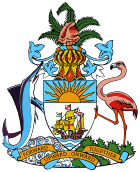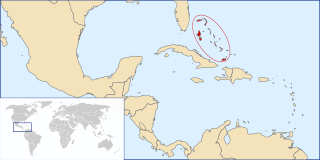 |
|---|
Political parties in the Bahamas may be "classified", "nonclassified", or "unclassified". Classified parties are "major" or "minor" depending on electoral performance and competitive ability. [ citation needed ]
 |
|---|
Political parties in the Bahamas may be "classified", "nonclassified", or "unclassified". Classified parties are "major" or "minor" depending on electoral performance and competitive ability. [ citation needed ]
| Party | Abbr. | Leader | Political position | Ideology | Senators | Assembly members | |
|---|---|---|---|---|---|---|---|
| Progressive Liberal Party | PLP | Philip Davis | Centre to centre-left | Social liberalism Progressivism Populism | 12 / 16 | 32 / 39 | |
| Free National Movement | FNM | Michael Pintard | Centre-right | Conservative liberalism | 4 / 16 | 7 / 39 | |

The Bahamas, officially the Commonwealth of The Bahamas, is an island country within the Lucayan Archipelago of the West Indies in the Atlantic Ocean. It contains 97% of the Lucayan Archipelago's land area and 88% of its population. The archipelagic state consists of more than 3,000 islands, cays, and islets in the Atlantic Ocean, and is located north of Cuba and northwest of the island of Hispaniola and the Turks and Caicos Islands, southeast of the U.S. state of Florida, and east of the Florida Keys. The capital is Nassau on the island of New Providence. The Royal Bahamas Defence Force describes The Bahamas' territory as encompassing 470,000 km2 (180,000 sq mi) of ocean space.

The Bahamas is a parliamentary constitutional monarchy headed by King Charles III in his role as King of the Bahamas. The politics of The Bahamas takes place within a framework of parliamentary democracy, with a Prime Minister as the Head of Government. The Bahamas is an Independent Country and a member of the Commonwealth of Nations. As a former British colony, its political and legal traditions closely follow those of the United Kingdom. King Charles III is the head of state, but executive power is exercised by the cabinet. Legislative power is vested in the two chambers of parliament. The Judiciary is independent of the executive and the legislature and jurisprudence is based on English common law. The multi-party system is dominated by the Progressive Liberal Party and the Free National Movement. The constitution protects freedom of speech, press, worship, movement, and association.
An electoral alliance is an association of political parties or individuals that exists solely to stand in elections.

Pro-Europeanism, sometimes called European Unionism, is a political position that favours European integration and membership of the European Union (EU).

Sir Roland Theodore Symonette, NH was a Bahamian politician and the first Premier of the Bahamas after self-government was achieved in 1964. He was leader of the United Bahamian Party (UBP), which some felt represented the interests of the "Bay Street Boys" and was the ruling party between 1958 and 1967. After 1967 Sir Roland Theodore Symonette asked Sir Randol Fawkes to join the U.B.P after the 1967 results were released, in order to assist the U.B.P in the formation of a new government.

The Bahamas Democratic Movement (BDM) is a liberal-populist political party in the Bahamas representing the interests of young people.
In parliamentary politics, balance of power is a situation in which one or more members of a parliamentary or similar chamber can by their uncommitted vote enable a party to attain and remain in minority government. The term may also be applied to the members who hold that position. The members holding the balance of power may guarantee their support for a government by either joining it in a coalition government or by an assurance that they will vote against any motion of no confidence in the government or will abstain in such a vote. In return for such a commitment, such members may demand legislative or policy commitments from the party they are to support. A person or party may also hold a balance of power in a chamber without any commitment to government, in which case both the government and opposition groupings may on occasion need to negotiate for that person's or party's support.

The following is an alphabetical list of topics related to the Commonwealth of The Bahamas.

General elections were held in the Bahamas on 10 January 1967. The result was a tie between the Progressive Liberal Party and the United Bahamian Party, both of which won 18 seats. In a reversal of the previous election, this time the PLP received a lower share of the vote than the UBP, but was able to form the country's first black-led government with the support of the sole Labour Party MP Randol Fawkes.
The United Bahamian Party (UBP) was a major political party in the Bahamas in the 1950s and 1960s. Representing the interests of the white oligarchy known as the Bay Street Boys, including Stafford Sands, it was the ruling party between 1958 and 1967. It was led by Roland Theodore Symonette.
The Labour Party was a minor political party in the Bahamas. In the 1962 general elections it won a single seat, taken by Randol Fawkes. Fawkes retained his seat in the 1967 elections, in which the United Bahamian Party and the Progressive Liberal Party won 18 seats each. Although the UBP had won more votes, Fawkes supported the PLP, allowing them to form a government. Fawkes retained his seat again in the 1968 elections, but the party did not contest the 1972 elections.
Sir Randol Francis Fawkes was a Bahamian politician, trade unionist and lawyer.
Charles T. Maynard was a Bahamian politician. He was National Chairman of the Free National Movement political party (FNM). Formerly a member of Bahamian parliament, and a minister of youth, sports and culture, Maynard died of an apparent heart attack while campaigning for the FNM in 2012. He was 42, and had been considered a "rising political talent". He was the cousin of Bahamian Attorney-General Allyson Maynard Gibson.

General and local elections were held in Botswana on 24 October 2014. The result was an eleventh straight victory for the Botswana Democratic Party, which won 37 of the 57 elected seats. Incumbent President Ian Khama was sworn in for a second term on 28 October.